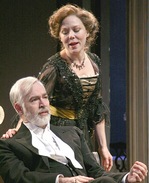A CurtainUp New Jersey Review
The Little Foxes
|
I hope you die. I hope you die soon. I'll be waiting for you to die.
—Regina (to her husband Horace) |

Regina Giddens, played by Kathryn Meisle, uses her cunning skills to manipulate her brother Benjamin, played by Philip Goodwin.
(Photo: Gerry Goodstein) |
For those familiar with the Hubbards— that infamously greedy, selfish, corrupt, ethically-challenged Southern family— it is Regina Giddens who traditionally demands our most undivided consideration as she determinedly proceeds to secure her share of the family's impending fortunes from her ruthless brothers. Kathryn Meisle, a Tony-nominated actress, has proven time and time again she can be a dramatic dominatrix. As Regina, she affects a subdued, cautiously venomous front as the woman who decides she can be as underhanded and treacherous as necessary.
Melodramatic at its core, we are nevertheless drawn into the play's relentless drive as Regina takes on her sneaky-to-a-fault brothers Oscar (Brian Dykstra) and Benjamin (Phillip Goodwin) as they attempt full control of the construction of a cotton mill. To this end, she will do anything, including virtually affect the demise of her morally upright banker husband Horace (Bradford Cover). As the middle-aged Regina, Meisle delivers the dramatic goods with verve and nerve and looks especially Tarantula-ed in a black gown, the inspiration of costume designer Brian Russman. (It can't be helped that I still see Meisle (in my mind's eye) as a glowing ingënue).
It was rare indeed, for a woman to be an industrial mover and shaker at the turn of the last century (the play is set in 1900) and certainly not in the South. But what is it about the almost stealthily devised but unforeseeable shift we make from Regina's machinations to the plight of her sister-in-law Birdie (Deanne Lorette), Oscar's wife. It happens early and it remains a constant throughout the play. It isn't just that Birdie, born of gentry whose family plantation is now owned by the Hubbards, is reduced to spouting blather, or as Oscar puts it, "she chatters like a magpie."
Why is Birdie suddenly the pulse and the prevailing heartbeat of this otherwise brilliantly callous portrait of a ruthless family? She is undeniably a figure of pity and needs our sympathy. She is ridiculed, belittled and physically mistreated by Oscar. Look to Lorette, who is in her first season at Shakespeare Theatre of NJ, to serve as the play's wellspring of emotional pain even as she casts upon it a luminous reflection of embattled gentility. As Birdie, the best played in my memory, discloses some personal well-kept secrets to Regina's yet-unspoiled daughter Alexandra (Lindsey Wochley) and to the house maid Addie (Venida Evans) she becomes the unexpected heartbeat of the play in Act III.
Evans as the maid and Ron Brice, who plays the Giddens' man-servant, are terrific and bring a concerted and carefully delineated sub-text to their supporting roles that might otherwise not demand more than our passing interest: remembering the adage that there are no small parts only small actors. As for the brothers, Brian Dysktra is splendid as the viciously condescending Oscar as is Philip Goodwin as the more insidiously conspiring Ben. Fisher Neal neatly filled the shoes of Oscar's irretrievably stupid son Leo.
The Giddens' residence deserves formidable consideration, the dark wood paneling, obligatory staircase, dining area behind French Doors, and the Victorian furnishings are the impressive work of set designer Scott Bradley. The play's title is derived from the King James version of the Song of Solomon ("Take us the foxes, the little foxes, that spoil the vines: for our vines have tender grapes"). It remains a gripping reminder that there is a price to pay for the recycling of greed and the ravaging of our humanity as we enter another century.
Tallulah Bankhead famously originated the role of Regina Giddens on Broadway in 1940. Bette Davis played Regina in the 1941 film version. Subsequent Broadway Reginas have been Anne Bancroft (1967), Elizabeth Taylor (1981, and Stockard Channing (1997).
|
The Little Foxes By Lillian Hellman Directed by Matthew Arbour Cast: Venida Evans (Addie), Ron Brice (Cal), Deanne Lorette (Birdie), Brian Dykstra (Oscar), Fisher Neal (Leo), Kathryn Meisle (Regina), Einar Gunn (William Marshall), Philip Goodwin (Ben), Lindsey Wochley (Alexandra Giddens) Bradford Cover (Horace) Set Designer: Scott Bradley Costume Designer: Brian Russman Lighting Designer: Tyler Micoleau Sound Designer: Richard M. Dionne Running Time: 2 hours 30 minutes including 2 intermissions The Shakespeare Theatre of New Jersey, Main Stage — The F.M. Kirby Shakespeare Theatre, 36 Madison Avenue, Madison, NJ. (973) 408 - 5600 Performances: Tuesdays, Wednesdays and Sundays at 7:30 PM; Thursdays thru Saturdays at 8 PM; Saturday and Sundays at 2 PM. Prices: ($30 - $54) Opened: 06/06/09 Ends: 06/28/09 Review by Simon Saltzman based on performance 06/07/09 |






